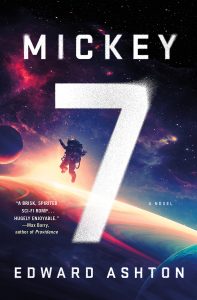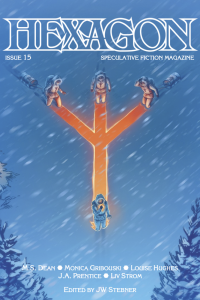Gabino Iglesias Reviews Mickey7 by Edward Ashton
 Mickey7, Edward Ashton (St. Martin’s 978-1-25027-503-5, $27.99, 304pp, hc) February 2022.
Mickey7, Edward Ashton (St. Martin’s 978-1-25027-503-5, $27.99, 304pp, hc) February 2022.
One of the most impressive things about genre fiction is its ability to surprise and entertain regardless of how long we’ve been reading it. Edward Ashton’s Mickey7, his third novel, is a multilayered, wildly entertaining story that takes readers into a human colony fighting to survive on a truly inhospitable planet of rock and extreme cold that somehow also manages to be an exploration of mortality, a look into what makes us who we are, and a meditation on the consequences of immortality and cloning. The novel was recently picked up and will be brought to the big screen by acclaimed director Bong Joon-Ho, with Robert Pattison set to star.
Mickey7 is an Expendable. His job is as bad it sounds: he’s an employee who’s destined to die time and again – sometimes for science, sometimes from accidents, and sometimes just when he’s devoured by centipede-like creatures – and then will be brought back as new version of himself that will hopefully have most of his recent memory intact. Mickey7, the seventh iteration of Mickey, joined a human expedition sent to colonize Niflheim, a really cold planet, because he was looking to escape a gambling debt. After he falls into a very deep hole, a rescue pilot who’s been friends with Mickey7 since before they both joined the mission leaves him there to die. However, dying isn’t as easy as one would think, even with the knowledge that a new version of you will be pulled from a tank of goo soon after. Determined to live, Mickey7 starts to make his way out of the hole and is eventually picked up and carried back to the periphery of his base by one of the creatures known for killing humans. When he gets there, Mickey7 finds there’s already a Mickey8 waiting. Almost everyone considers Mickey7, whose job is to die time and again, a weirdo, and they shun him. They all think duplicates of a person are an absolute abomination, so both Mickeys are in a conundrum. Since neither one’s to die and they’re sure one of them will eventually get killed anyway, they decide to split their calorie allowance and keep the whole thing a secret, but doing so in a small base in the middle of a frozen planet where barely 200 people live, and while dating someone, is easier said than done. To make matters worse, the man in charge is a Natalist and loathes Mickey7 for what he represents. The thing that happened in the hole and its tunnels holds crucial information, but sharing it could mean Mickey7’s permanent death. What follows in a wildly entertaining, hilarious, action-packed story about a man and himself trying to keep it together while keeping a huge secret in a very small place.
Mickey7 is a fun, fast-paced read. Ashton takes elements of noir, a dash of philosophy, and a healthy dose of humor and infuses what could have been a straightforward science fiction narrative with a barrage of small details and stories-within-stories (the tales of failed colonies and their horrible fates are definitely a highlight and worth the price of admission!) that make it the kind of book that is – pardon the cliché – really hard to put down.
When a story is heavy on dread – and being killed repeatedly and facing a final death sentence can induce a fair amount of dread – empathy becomes crucial, and Ashton puts a lot of time and effort into creating a down-on-his-luck, regular, funny man who happens to be very likeable, relatable, and obsessed with the same things many science fiction readers would be obsessed with if they ended up trying to colonize a strange planet. And the fun doesn’t stop there. There is plenty going on here. From the story of a famous scientist who ended up moving to a distant planet, killing everyone to clone himself, and trying to take over other planets, to a threesome between Mickey7, his girlfriend, and Mickey8, almost every chapter in this book packs either a bizarre revelation or a little surprise that forces readers to keep turning the pages. As mentioned above, the narratives about failed colonies are at the top of that fun list. Here’s a passage describing the creatures that ended a colony:
There were tiny little biting things that came in the wind, burrowed into any exposed skin, and brought itching rashes, then pus-filled blisters, then sepsis, then death. There were things like sand-burrowing starfish with armor-piercing fangs. They injected a necrotizing venom that killed in minutes. There were insectile things half the size of a man that shot jets of concentrated sulfuric acid from glands in their heads. Most of the creatures on the planet seemed purpose-built to defeat the colony’s defenses, and though it seems obvious to us now what was going on, as near as we can tell from the records their Command transmitted before they went down, they never did figure it out.
Ashton is a talented storyteller and Mickey7 has something for everyone while also putting a fresh spin on the idea of clones. While this is wild romp that brings very human problems to outer space, it’s also smart science fiction that looks at how a future of humans trying to colonize other planets after destroying ours could look like. In fact, it might just be enough to make some readers think they would like to risk it all and join one of those missions, although whether not they’d do so as an Expendable is a decision they’d have to sleep on after they finish reading this novel.
Gabino Iglesias is a writer, journalist, professor, and book reviewer living in Austin TX. He is the author of Zero Saints and Coyote Songs and the editor of Both Sides. His work has been nominated to the Bram Stoker and Locus Awards and won the Wonderland Book Award for Best Novel in 2019. His short stories have appeared in a plethora of anthologies and his non-fiction has appeared in the New York Times, the Los Angeles Times, and CrimeReads. His work has been published in five languages, optioned for film, and praised by authors as diverse as Roxane Gay, David Joy, Jerry Stahl, and Meg Gardiner. His reviews appear regularly in places like NPR, Publishers Weekly, the San Francisco Chronicle, Criminal Element, Mystery Tribune, Vol. 1 Brooklyn, the Los Angeles Review of Books, and other print and online venues. He’s been a juror for the Shirley Jackson Awards twice and has judged the PANK Big Book Contest, the Splatterpunk Awards, and the Newfound Prose Prize. He teaches creative writing at Southern New Hampshire University’s online MFA program. You can find him on Twitter at @Gabino_Iglesias.
This review and more like it in the March 2022 issue of Locus.
 While you are here, please take a moment to support Locus with a one-time or recurring donation. We rely on reader donations to keep the magazine and site going, and would like to keep the site paywall free, but WE NEED YOUR FINANCIAL SUPPORT to continue quality coverage of the science fiction and fantasy field.
While you are here, please take a moment to support Locus with a one-time or recurring donation. We rely on reader donations to keep the magazine and site going, and would like to keep the site paywall free, but WE NEED YOUR FINANCIAL SUPPORT to continue quality coverage of the science fiction and fantasy field.
©Locus Magazine. Copyrighted material may not be republished without permission of LSFF.








